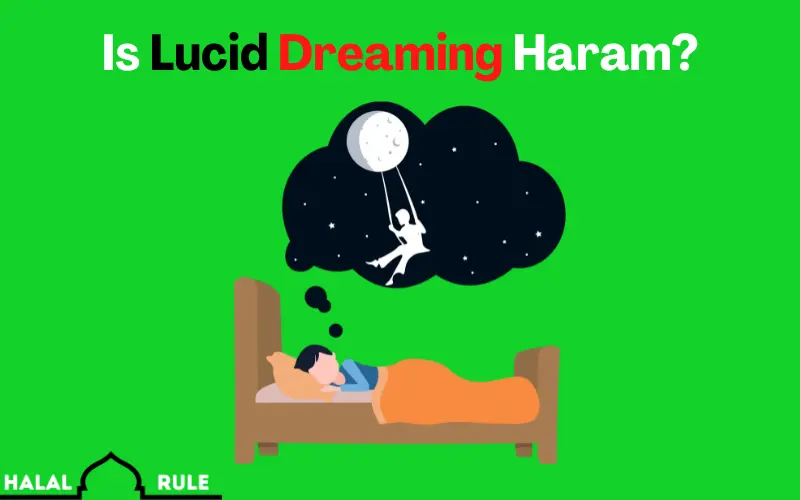Is Lucid Dreaming Haram Or Halal In Islam?
Lucid dreaming is a phenomenon that has fascinated humans for centuries. It is defined as the act of being aware that you are dreaming while still in the dream state.
This allows the dreamer to have some level of control over their dreams and can lead to incredibly vivid and realistic experiences.
However, with its popularity has come the question of whether lucid dreaming is allowed in certain religions, specifically Islam.
In this blog post, we will answer is lucid dreaming haram or halal in Islam and explore this practice’s ethical and spiritual implications.

Is Lucid Dreaming Haram
It depends on what aspect of lucid dreaming is being practiced. The concept of lucid dreaming itself is not explicitly mentioned in the Quran or Hadith, as it was not yet discovered during the time of Prophet Muhammad (peace be upon him). Therefore, there is no direct ruling on this practice.
However, according to Islamic teachings, anything that goes against the principles of Islam and is harmful to oneself or others is considered haram (forbidden).
In the case of lucid dreaming, if it involves actions or thoughts that are considered sinful in Islam, then it would be considered haram.
For example, if someone uses lucid dreaming to engage in a relationship with non mahram individuals or engages in behaviors deemed haram, such as eating or drinking haram things, it would be considered haram.
Additionally, if lucid dreaming is causing harm to one’s physical or mental health, then it would also fall under the category of haram.
On the other hand, if lucid dreaming is used as a way to explore one’s subconscious mind and gain a better understanding of oneself, then it would not be considered haram.
For example, if someone uses lucid dreaming to overcome fears or work through personal issues, it can be seen as a form of self-improvement, not haram.
Also, you can use lucid dreaming to get better spiritual experiences with Allah, but it is not encouraged to rely solely on lucid dreaming for spiritual growth.
Lastly, it is important to note that lucid dreaming should never be confused with astral projection or out of body experiences. These practices are not allowed in Islam as they involve leaving the physical body and interacting with the spiritual realm.
It is better to avoid these practices as they can lead to spiritual harm and open the door to negative influences.
If you like lofi quran, learn here is lofi quran haram.
When Lucid Dreaming Becomes Haram
As mentioned earlier, lucid dreaming can become haram if it involves actions or thoughts that are against the principles of Islam.
It is important to remember that even in a dream state, we are still accountable for our actions and intentions. Therefore, engaging in sinful behavior while lucid dreaming would be considered haram.
Furthermore, if someone becomes addicted to lucid dreaming and starts neglecting their obligations in the real world, then it would be considered haram. Islam teaches us to find balance in all aspects of our lives, and if lucid dreaming becomes a hindrance to fulfilling our duties, then it should be avoided.
Once you start lucid dreaming something haram, you’ll be attracted to do it in real life. That’s why it is important to be mindful of our intentions and actions, even while dreaming.
Also learn is earning money from games halal.
When Lucid Dreaming Is Halal
On the other hand, if lucid dreaming is used positively and beneficially, it can be considered halal.
For example, using lucid dreaming to gain insight into one’s subconscious mind or to connect with Allah through spiritual experiences would not be considered haram.
In fact, some argue that lucid dreaming can be a tool for spiritual growth and can bring one closer to Allah. It allows us to explore our inner selves and better understand our thoughts and desires.
Also, if you use it as the law of attraction technique or positive visualization tool, it is considered halal.
However, it is important to remember that lucid dreaming should never replace our obligations in the real world or become an addiction.
Also see is chrome hearts haram.
Tips To Avoid Lucid Dreaming
If you’re addicted to lucid dreaming, here are some tips that can help you avoid it and maintain a balance in your life:
- Limit your sleep time: Lucid dreaming often occurs during sleep’s REM (rapid eye movement) stage. Limiting your sleep time can reduce the chances of experiencing lucid dreams.
- Avoid sleeping on your back: Sleeping on your back increases the likelihood of lucid dreaming. Try sleeping on your side instead.
- Have a consistent sleep schedule: Having a regular sleep schedule can help regulate your REM stage and reduce the occurrence of lucid dreams.
- Seek help if needed: If you feel like you’re struggling with lucid dreaming addiction, seek help from a trusted friend or professional.
- Be practical: Remember that lucid dreaming is not a substitute for real-life experiences. Focus on living in the present and fulfilling your obligations in the real world.
If you’re thinking to donate blood, learn is it haram to donate blood.
FAQs
Q. Are lucid dreams haram?
A. It depends on the actions and intentions involved in the dream. It would be considered haram if it involves sinful behavior or neglect of obligations.
Q. is lucid dreaming a sin?
A. It would be considered a sin if it involves actions or thoughts that go against the principles of religious teachings. However, if used positively and beneficially, it can be considered halal.
Q. What are lucid dreams in Islam?
A. In Islam, lucid dreaming has no specific ruling, but it is important to be mindful of our intentions and actions in any state, including dreams. It can be seen as permissible if used for self-improvement or spiritual growth.
Q. What does Islam say about lucid dreams?
A. There is no direct ruling on lucid dreaming in Islam as it is not included in the Quran or any hadith.
Q. Is lucid dreaming halal?
A. It depends on the intention and actions involved. If it is used for self-improvement, creativity, or spiritual growth within the boundaries of Islam, then it can be considered halal. However, if it involves any sinful actions or thoughts, then it would be considered haram.
Q. Is astral projection haram?
A. Astral projection, also known as an out-of-body experience, is closely related to lucid dreaming but involves the belief that the soul leaves the body and travels to other realms. This concept goes against Islamic beliefs, as it is believed that only during death does the soul leave the body. Therefore, astral projection would be considered haram in Islam.
Q. Is visualization haram?
A. Visualization is a common technique used in lucid dreaming to control the dream environment. It involves imagining or visualizing specific scenarios or objects in the dream. As long as it does not involve any sinful actions or thoughts, visualization can be considered halal within the boundaries of Islam.
Conclusion
In conclusion, lucid dreaming is a complex topic in Islam with no direct ruling. However, it can become haram if it involves sinful behavior or neglect of obligations.
On the other hand, if used positively and beneficially, it can be considered halal or permissible. It is important to maintain balance in all aspects of our lives and seek help if we feel like we are becoming addicted to lucid dreaming.
Remember, our ultimate goal as Muslims should be to please Allah and follow the teachings of Islam in all aspects of our lives.
So, let us use lucid dreaming as a tool for self-improvement and spiritual growth rather than falling into sinful actions or neglecting our duties.
I hope your search is lucid dreaming haram has been answered and this blog post has provided you with some clarity on the topic. Thank you for reading, and may Allah guide us towards what is good and beneficial for us in this life and the hereafter.






